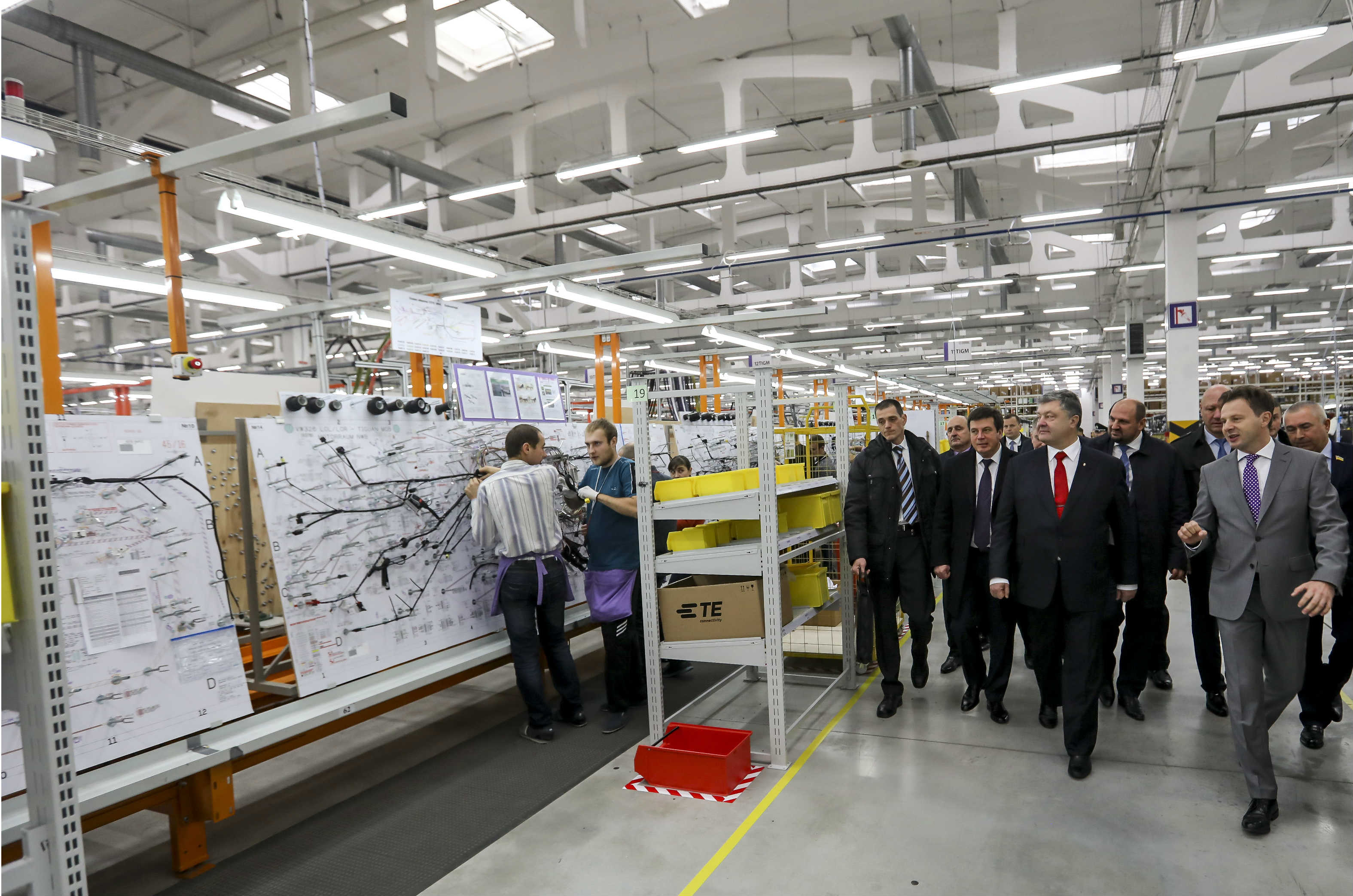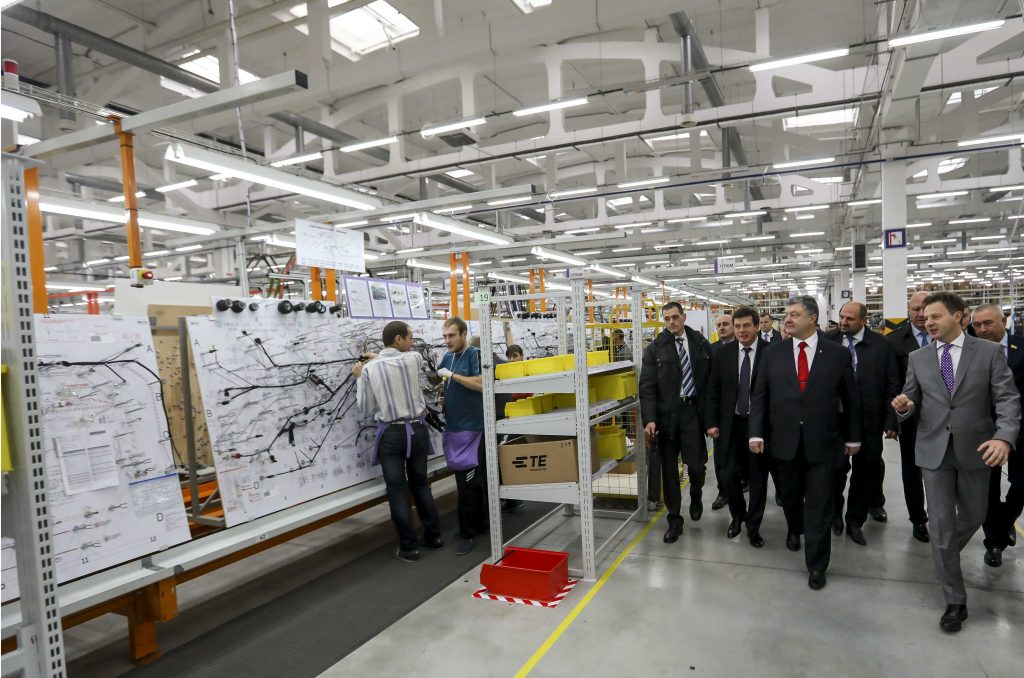 Ukraine’s industrial sector has had a difficult spell. The production of heavy coal, steel, and machinery, inherited from the Soviet past, have traditionally been linked to technologically obsolete post-Soviet markets and until recently were declining. The war in eastern Ukraine and Russia’s closure of its markets as a punishment for Ukraine’s pro-Western course only accelerated this process, and many post-Soviet Ukrainian enterprises, especially in eastern Ukraine, had long been deteriorating.
Ukraine’s industrial sector has had a difficult spell. The production of heavy coal, steel, and machinery, inherited from the Soviet past, have traditionally been linked to technologically obsolete post-Soviet markets and until recently were declining. The war in eastern Ukraine and Russia’s closure of its markets as a punishment for Ukraine’s pro-Western course only accelerated this process, and many post-Soviet Ukrainian enterprises, especially in eastern Ukraine, had long been deteriorating.
However, the past few years have seen the emergence of a new wave of industrial businesses in Ukraine. Recently, a trade community on Facebook mapped all of the enterprises that have opened in Ukraine since 2015. The group found that during this period, fifty-six new enterprises opened and began production, while thirty-nine more are under construction and are scheduled to open before 2020.
There are several noteworthy examples of new plants and factories:
- Tile factory in Ivano-Frankivsk. Ondo, a new factory that produces natural cement-sand roof tiles, opened in western Ukraine in August 2015. Total investment has already exceeded $1 million. Ondo is capable of producing up to 250,000 square meters of tiles per year. The enterprise uses equipment from Italy and says it adheres to EU standards.
- Foundry in Kropyvnytskyi. Metalit foundry, which opened in April 2016 in central Ukraine, has already provided more than 200 jobs. A project of this foundry was implemented by Ukraine’s Elworty Group in cooperation with Denmark’s DISA Industries. The enterprise has attracted more than $5 million in investment.
- Electric equipment plants in the Lviv region. In 2016, Fujikura Automotive Ukraine opened two plants in the villages of Pidriasne and Riasne-Rus’ke in western Ukraine. These enterprises produce vehicle electricity distribution systems. Both plants created more than 3,000 jobs for Ukrainians.
- Optical equipment plant in the Zhytomyr region. Kromberg & Schubert Ukraine, a division of the international manufacturer of electrical and optical equipment, opened its plant in the central Ukrainian town of Oliivka on October 27, 2016. The project is worth 30 million euro, and 2,000 Ukrainians are employed at this facility.
- Industrial park in Vinnytsia. Volodymyr Groisman, Ukraine’s prime minister and the former mayor of Vinnytsia in central Ukraine, opened an industrial park in his native city in July 2016. It serves as a base for a new plant by UBC Group that produces draft beer systems and beer cooling equipment. According to Groisman, Vinnytsia Industrial Park will attract investments worth 30 million euro; Vinnytsia mayor Serhiy Morgunov has said it will create up to 7,000 jobs.
Ukraine’s economy is beginning to recover from a deep crisis caused by war and the closure of Russian markets, and its industry has the potential to experience a genuine revival in the next few years. The fact that many new enterprises have opened due to foreign investment means that Ukraine’s investment attractiveness has improved, although it remains far from ideal.
These positive trends in investment attractiveness have been borne out by a recent study by the European Business Association, showing that Ukraine’s Investment Attractiveness Index has finally improved. In the first half of 2017, the index reached 3.15 out of possible 5, which is the highest result in last six years. This is progress compared to December 2016, when Ukraine’s score was 2.85. EBA bases its analysis on expert evaluations from 142 directors of the biggest international and Ukrainian companies.
This non-extensive list of new enterprises (dozens more have opened recently) illustrates another important trend: Ukraine’s economic regions are slowly changing their specializations. Denys Kazanskyi, a Ukrainian journalist and blogger, pointed out that the new factories are mostly opening in western and central Ukraine, regions that were previously largely agricultural. It seems that the country’s industrial core might be finally shifting away from the eastern and southern regions. The war in the Donbas is certainly taking its toll in humanitarian and political terms, but it might also be changing the economy of Ukraine as we know it.
Vitalii Rybak is an analyst at Internews Ukraine. This article was prepared within the UkraineWorld Group.
Image: Ukraine President Petro Poroshenko visits Kromberg & Schubert Ukraine, a division of the international manufacturer of electrical and optical equipment, which opened its plant in the central Ukrainian town of Oliivka on October 27, 2016. Credit: Presidential Administration of Ukraine.
